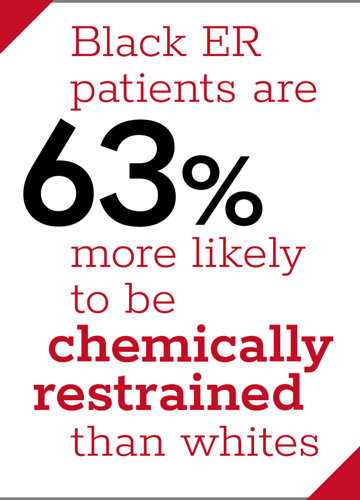“I can’t breathe,” Frederick gasped as the adults crushed him into the floor. Ten minutes later, he lost consciousness. Two days later, he died from cardiac arrest.
Frederick’s final words weren’t unique. According to a 2025 study in the Journal of Forensic and Legal Medicine, nearly 20 percent of Americans who die under prone restraint utter those very same words—and three in 10 who perish this way are Black.
There is no mystery about how these deaths happen. And there is no mystery regarding who they most often happen to.
The report, aptly titled “I Can’t Breathe,” reveals that most victims die within five minutes of being restrained.
The phrase echoes across courtrooms, protest placards and gravestones—from Cornelius Frederick in Michigan to the Judge Rotenberg Center in Massachusetts, an institution that houses people with disabilities, and which has been condemned by the United Nations Special Rapporteur on Torture for using electric shock devices on children with disabilities—many of them Blacks or Latinos.
The outcry has been growing—quiet in some corners, thunderous in others. It rose again this spring in Los Angeles, as demonstrators rallied outside the first in-person annual meeting of the American Psychiatric Association (APA) held in the City of Angels in four decades. The protest, led by the Citizens Commission on Human Rights International (CCHR), a nonprofit founded by the Church of Scientology and devoted to exposing human rights violations in the field of mental health, spotlighted what organizers called “deadly restraint practices, forced treatment and psychiatric abuse hidden behind a $329 billion taxpayer-funded system.”

Restraints, as defined by the US Substance Abuse and Mental Health Services Administration (SAMHSA), involve any method—manual or mechanical—that limits a person’s ability to move freely. In practice, that often means children held facedown, with their wrists pinned and their breathing restricted—sometimes until it stops altogether.
The New York Times documented one such tragedy in 1998: 11-year-old Andrew McClain, a Black foster child, was crushed to death in a private Connecticut hospital after disobeying a cafeteria seating order. His death occurred shortly before he was scheduled to be reunited with his family.
Tragically, referring to the deaths of McClain and Frederick has become a chilling shorthand for systemic abuse. The following cases, documented by CCHR, reflect the disproportionate toll of restraint deaths on communities of color in psychiatric facilities:
- Ja’Ceon Terry, 7, died in 2022 of positional asphyxia in a Kentucky psychiatric facility. The cause? A staff-administered chokehold later ruled a homicide.
- Jeremiah Flemming, 15, died in 2017 after being restrained at a psychiatric center in Virginia.
- Omega “Manny” Leach, 17, asphyxiated in 2007 during a chokehold at a Tennessee youth mental health facility.
- Roshelle Clayborne, 16, died in 1997 after being restrained and injected with Thorazine, a potentially fatal antipsychotic drug, in a San Antonio, Texas, institution. “Her limp body was rolled into a blanket and dumped in an 8-by-10-foot room,” the Hartford Courant reported.
Those deaths, disproportionately affecting Black youth, reflect what SAMHSA and the National Association of State Mental Health Program Directors have called the result of “treatment failure.”
The CCHR report “Psychiatry’s Legacy of Racism and Coercion Highlighted in Restraint Deaths” outlines stark disparities rooted in abuses that are “part of a systemic problem fueled by discredited psychiatric and psychological theories.” Among them:
- African Americans make up only 13.5 percent of the US population, but account for:
- 33.6 percent of schizophrenia diagnoses
- 21.4 percent of ADHD diagnoses
- 28 percent of conduct disorder diagnoses in children
- 27.4 percent of oppositional defiant disorder diagnoses
- In emergency rooms, Black patients are 63 percent more likely to be chemically restrained than white patients.
- Blacks account for 22 percent of restraint-related deaths in state institutions, residential treatment facilities, wilderness camps and psychiatric hospitals.
The APA finally acknowledged its complicity in 2021, issuing a formal apology to Black, Indigenous and People of Color (BIPOC) for decades of structural racism. “Early psychiatric practices laid the groundwork for the inequities in clinical treatment that have historically limited quality access to psychiatric care for BIPOC,” the APA wrote.
But for too many families, apologies come far too late.
There is no mystery about how these deaths happen. And there is no mystery regarding who they most often happen to.
Cornelius Frederick, Ja’Ceon Terry, Andrew McClain and countless unnamed others didn’t die because they were violent or beyond help. They died because restraint was easier than empathy. Because institutional control was prioritized over human dignity. And because, in America’s psychiatric and behavioral health system, Black children are too often seen as threats before they’re seen as people.
Until that changes, these children will keep dying. And the country that mourns them in hashtags will remain complicit in the quiet erasure of their pain.






















